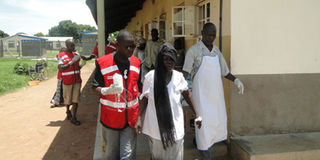Ministry confirms cholera in Moyo

A suspected cholera patient being led to a ward at Obongi Health CentreIV by Mr Charles Anyama of Red Cross. PHOTO BY SCOVIN ICETA
What you need to know:
Epidemic. Several people have been admitted since last week in what was at first thought to be an Ebola outbreak.
Kampala.
The Ministry Health has confirmed an outbreak of cholera in Moyo district that has so far killed four people and left 102 others affected.
Following confirmatory tests obtained from the Central Public Health Laboratories, the ministry in a statement said that 49 people are still admitted at Obongi Health Centre IV while 53 patients have been discharged.
The disease outbreak was first reported on April 26 after a number of patients reported at Obongi Health Centre IV with fever, abdominal pain, diarrhea and vomiting resulting in dehydration.
The outbreak is reported in Gimara and Aliba Sub-counties and West Moyo County in Lefori Sub-county.
Earlier, the disease was suspected to be Ebola but according to the Commissioner for Community Health, Dr Anthony Mbonye, blood samples from the affected persons have been tested at the Uganda Virus Research Institute and results were negative for Ebola and other related viruses as was earlier suspected.
The ministry spokesperson, Ms Rukia Nakamatte, said a team of experts from the ministry, World Health O,rganisation and the Uganda Red Cross Society has been dispatched to Moyo to support the district respond to the disease.
facts on cholera
According to the World Health Organisation, Cholera is an acute diarrhoeal disease that can kill within hours if left untreated. Cholera is caused by bacteria (Vibrio cholerae) which enters a person through drinking water or eating food contaminated with human faeces.
It’s transmission is usually due to poor sanitation and poor hygiene practices like not washing hands after defecation and before eating or handling food and drinking unboiled water.
dos and donts
The Ministry of Health has appealed to the public to;
• Eat hot food.
• Do not eat food sold on the street
• Drink boiled water from clean containers
• Collect and keep water in clean containers
• Wash hands including those of children before eating or after using the latrine/toilet
• Do not handle patients with bare hands.
• Disinfect patients’ clothes before washing them.
• Immediately seek or advise patients who present with diarrhoea, abdominal pain and vomiting to seek medical care.
• Report all sickness and deaths to health authorities
• Do not handle the dead people with bare hands; and bury immediately (preferably using a district burial team).




